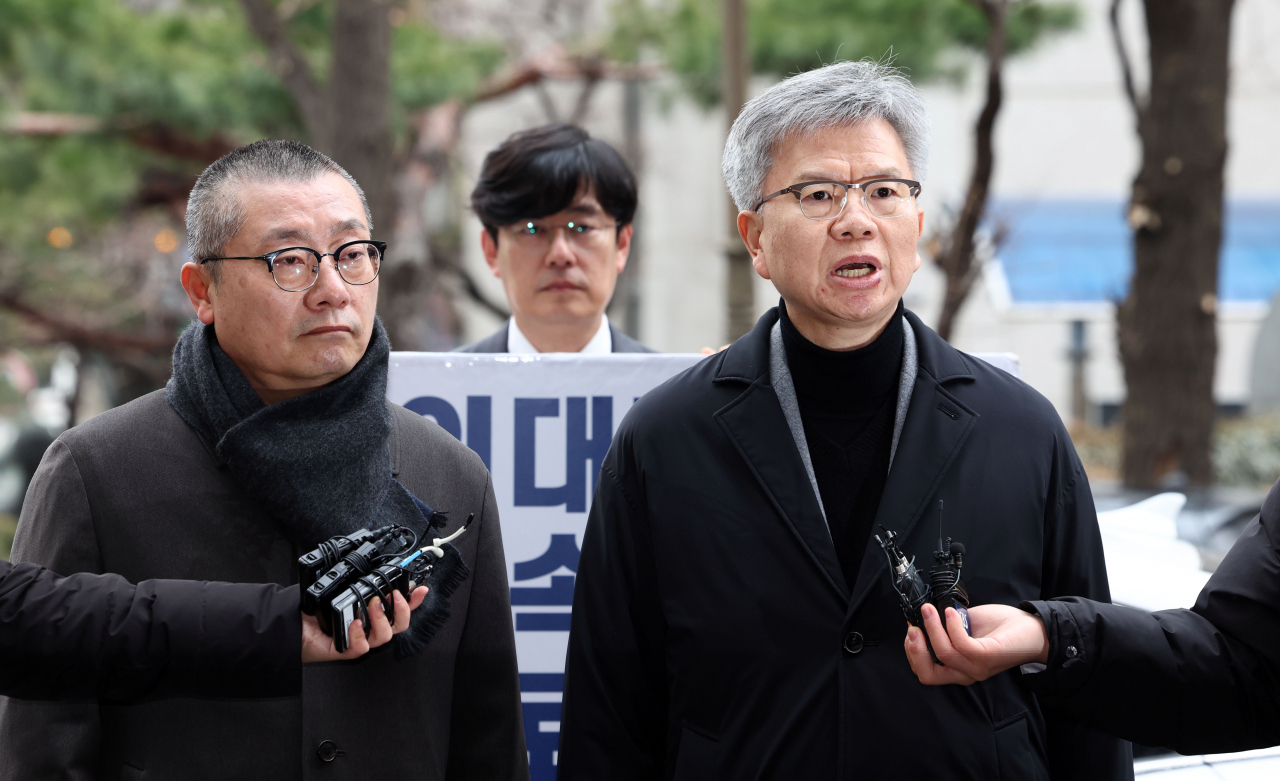 |
Park Myung-ha (left), who heads organizational affairs at the Korea Medical Association, and Kim Taek-woo, the head of the KMA's emergency committee, speak to reporters before being questioned by the police in Seoul on Tuesday. (Yonhap) |
The health ministry has sent a final notice of license suspension to two leaders of a lobby group of senior doctors, the two doctors said Monday, marking the first formal suspension of a license since trainee doctors walked off their job in protest of a plan to increase the number of medical students.
The final notice was sent to Park Myung-ha and Kim Taek-woo, leaders of an emergency committee at the Korea Medical Association, Park told Yonhap News Agency by telephone.
"I have received a formal notice from the government of the suspension of my license," Park said.
Kim also said he received the same notice from the government.
Under the punitive measure, the two doctors' medical license will be suspended starting April 15 for three months.
"I should have more discussions with other members," Park said. "I'll file an administrative lawsuit."
Park and Kim have been the subject of a punitive measure for allegedly throwing their support behind the labor action by trainee doctors, according to the ministry.
The government has been warning that doctors involved in the walkout may face legal consequences, noting that those who defy the return-to-work order may face punishments, such as license suspension.
Health Minister Cho Kyoo-hong, meanwhile, expressed grave concern about a decision by medical professors to resign en masse in support of the junior doctors' walkout.
With the labor action by junior doctors showing little signs of backing down, the emergency committee of medical professors announced Friday that faculty members from 16 medical schools will submit resignations en masse on March 25 in an effort to seek a breakthrough in the prolonged impasse.
"Despite the people's concerns and the government's repeated appeals, we express grave concern over making such an announcement," Cho told a government response meeting.
"The people will find it difficult to comprehend their claim that they will leave patients en masse in order to seek dialogue and compromise," he added.
The health minister urged professors to focus their efforts on persuading medical students and junior doctors to return to schools and hospitals, while engaging in discussions to improve the country's medical system.
Later Monday, Cho met with heads of the country's top five hospitals and asked them to arrange a meeting with striking trainee doctors.
Those hospitals depend heavily on trainee doctors to supplement their manpower shortage with about 40 percent of their doctors being trainee doctors.
Cho plans to hold another session with administrators of state-run hospitals Tuesday.
"We plan to monitor the overall status of the emergency medical system and listen to their difficulties," Cho said.
Second Vice Health Minister Park Min-soo, meanwhile, told reporters that the government plans to revamp a scheme to help doctors in essential medical fields receive more fees from the national health insurance.
"We aim to address the negative aspects of the fee-for-service system by revamping the medical insurance program through the adoption of a value-based payment system, ensuring its sustainability," Park said.
Park also said the government will inject around 3 trillion won ($2.25 billion) to revitalize obstetrics and pediatrics departments, which have been hit by the country's declining birthrates.
The government has been pushing to sharply raise the number of medical students to brace for the country's fast-aging population, and a shortage of physicians in rural areas and essential areas, such as pediatrics and emergency departments.
Doctors, on the other hand, say the quota hikes will undermine the quality of medical education and result in higher medical costs for patients. They have called for measures to first address the underpaid specialists and improve legal protection against excessive medical malpractice lawsuits. (Yonhap)







